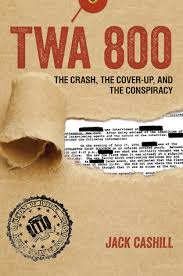Clintons Have Long, Dirty History with Russia
![]()

Order Jack Cashill's latest book, TWA 800: The Crash, the Cover-Up, and the Conspiracy
![]()

About Silenced: Flight 800
and the Subversion
of Justice (DVD) -
-Buy the Silenced DVD-
![]()
© Jack Cashill
October 25, 2017 - WND.com
In 1993, Bill and Hillary Clinton selected Ron Brown to be their Secretary of Commerce not in spite of his history of corruption but because of it.
Compromised as Brown was, especially after the president used his juice to clear him of a bribery charge involving Vietnam, Brown became the Clintons’ designated bagman for foreign cash. Brown hated the role, but unfortunately he earned it.
As things turned out, the Justice Department cleared Brown of his Vietnam charges rather in the nick of time. Just a week later, on February 10, 1994, without the taint of scandal, he was able to head up a delegation to Russia on the first of many large-scale trade missions.
As it also happened, on the very same day Brown left for Russia, an obscure Republican congressman from Pennsylvania, William Clinger, sent a letter of inquiry, the first of many he would send to Brown.
The timing of these two events was coincidental. But there is a haunting fatefulness about it nonetheless. The pressure Clinger generated would eventually spur Brown to lead his last, fatal trade mission to the Balkans. But on that day in February 1994, neither Brown nor Clinger could have conceived of such an end.
At the time, Clinger was the ranking Republican member of the House Committee on Government Operations. In 1994 this meant little. Republicans had not controlled the House in forty years, and no one expected them to do so for another forty. In truth, Clinger had more title than power and far less of either than Brown.
The congressman had sent the letter at the urging of one of his staffers. When the staff member had learned of the Vietnam bribe allegations, he decided to pull Brown’s financial disclosure forms and have a look.
Although he found nothing about Vietnam in the file, he did discover Brown had once had holdings in telecommunications, an industry that comes under the purview of Commerce.
Among Brown’s holdings that troubled Clinger was one called First International, a company that had, in fact, been conceived to explore communications opportunities in Eastern Europe and Russia.
Concerned, Clinger sent Brown a polite letter warning that the “mere appearance of a conflict of interest could severely erode public confidence.” Brown blew him off.
Three weeks later the Commerce ethics officer wrote back to Clinger telling him “we do not think it is appropriate” to answer many of the questions he had asked.
“It was sort of arrogant,” said Clinger. “He felt he didn’t have to respond. We were in the minority, and at that point, we couldn’t compel him to do anything.”
Brown would come to regret his arrogance. Vexed and more than a little vengeful, Clinger would become Brown’s Javert.
Unknown to Clinger, however, the rock he turned over was but a small one in a field of boulders. Starting that fateful day, February 10, Ron Brown was about to redefine the meaning of “conflict of interest.”
Even in a party of saints, the international trade mission had the potential to corrupt. And few who traveled with Brown to Russia ran any immediate risk of beatification, certainly not Roger Tamraz.
Tamraz would get his Warholian “fifteen minutes” by serving up the one moment of comic relief in the otherwise plodding 1997 Thompson hearings.
The Lebanese oil financier had donated $300,000 to the DNC and gotten in return an invite to several White House functions, including a dinner at which he had asked the president for help on a Central-Asian pipeline deal.
>
When questioned by Senator Joseph Lieberman whether he got his money’s worth in access, Tamraz, brash and self-aware, joked, “I think next time I’ll give $600,000.”
At the time of the Russian trip, however, about the only place one could see an image of Tamraz was on an Interpol bulletin board. As Senator Fred Thompson pointed out, a Lebanese court had charged Tamraz with embezzling $200 million from a bank.
A Jordanian court had convicted Tamraz in absentia for the same fraud and sentenced him to two years in prison. A French court had ordered him to pay $56 million in connection with a financial dispute. And there was an outstanding Interpol warrant for his arrest.
Said Thompson in dismay, “That was information that presumably [the Clinton administration] had access to.”
No matter. In February 1994 President Clinton authorized Tamraz to travel with Brown on the “presidential business development mission” to Russia.
Once there, administration officials arranged a series of meetings between Tamraz and Russian energy officials from the GAZPROM bureau.
A month later, according to a now declassified telegram, Commerce Department representatives in Russia were ordered to arrange meetings between Tamraz and the Russian first deputy minister of fuels and energy.
Of course, not all those traveling with Brown were as shady as Tamraz. On board, too, were executives from more reputable energy companies like Enron. In fact, Enron execs would become frequent flyers on Brown trade missions.
On Brown’s last one to Croatia, with impressive clairvoyance, they chose to take their own plane.

